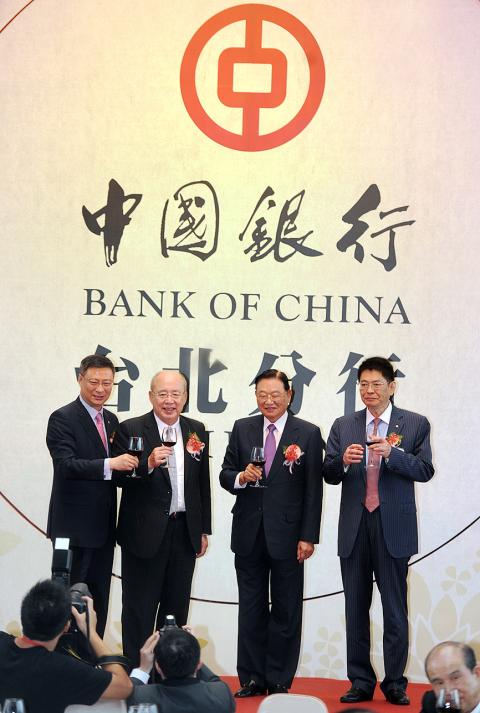Bank of China (中國銀行), the first Chinese lender to set up a branch in Taiwan, aims to forge closer ties with Taiwanese firms with operations in China, including offers of yuan settlement services once Taipei and Beijing work out a mechanism, the lender’s president Li Lihui (李禮輝) said yesterday.
Li, who hosted the official opening of the branch in Taipei, said he met with officials at the central bank and the Financial Supervisory Commission for talks on business development plans.
“As a commercial bank, we hope the two sides can promptly set up a currency settlement mechanism,” Li told a media briefing.

WARNING: EXCESSIVE CONSUMPTION OF ALCOHOL CAN DAMAGE YOUR HEALTH
Photo: Liao Chen-hui, Taipei Times
Bank of China is the world’s top provider of yuan settlement services, which amounted to 803 billion yuan (US$126 billion) for the first five months of the year, Li said.
“We are the main [yuan] settlement bank in Hong Kong, Macau and Malaysia and we hope to extend the services to Taipei once regulatory barriers are removed,” he said.
With cross-strait trade valued at US$160 billion last year and Taiwan’s trade surplus totaling US$89.8 billion, yuan settlement would save Taiwanese firms with cross-strait operations significant foreign-exchange costs and allow them to better control foreign-exchange risks, Li said.
Currently, only designated banking units can conduct yuan exchanges, but they cannot take yuan deposits or provide yuan loans. Further, domestic lenders may provide yuan-related business for corporate clients through their offshore banking units.
The designated banking units have to go through either Bank of Taiwan (台灣銀行) or Mega International Commercial Bank (兆豐銀行) for currency settlements with Bank of China in Hong Kong.
Li said Bank of China plans to provide over 200 billion yuan to help Taiwanese firms expand in China in the next three years.
Potential borrowers are Taiwanese firms that can advance China’s development plans and meet lending criteria, he said.
Li said the Taipei branch would keep close contact with the headquarters of Taiwanese firms with operations in China so the lender can better mobilize its global resources to strengthen services.

Sweeping policy changes under US Secretary of Health and Human Services Robert F. Kennedy Jr are having a chilling effect on vaccine makers as anti-vaccine rhetoric has turned into concrete changes in inoculation schedules and recommendations, investors and executives said. The administration of US President Donald Trump has in the past year upended vaccine recommendations, with the country last month ending its longstanding guidance that all children receive inoculations against flu, hepatitis A and other diseases. The unprecedented changes have led to diminished vaccine usage, hurt the investment case for some biotechs, and created a drag that would likely dent revenues and

Global semiconductor stocks advanced yesterday, as comments by Nvidia Corp chief executive officer Jensen Huang (黃仁勳) at Davos, Switzerland, helped reinforce investor enthusiasm for artificial intelligence (AI). Samsung Electronics Co gained as much as 5 percent to an all-time high, helping drive South Korea’s benchmark KOSPI above 5,000 for the first time. That came after the Philadelphia Semiconductor Index rose more than 3 percent to a fresh record on Wednesday, with a boost from Nvidia. The gains came amid broad risk-on trade after US President Donald Trump withdrew his threat of tariffs on some European nations over backing for Greenland. Huang further

CULPRITS: Factors that affected the slip included falling global crude oil prices, wait-and-see consumer attitudes due to US tariffs and a different Lunar New Year holiday schedule Taiwan’s retail sales ended a nine-year growth streak last year, slipping 0.2 percent from a year earlier as uncertainty over US tariff policies affected demand for durable goods, data released on Friday by the Ministry of Economic Affairs showed. Last year’s retail sales totaled NT$4.84 trillion (US$153.27 billion), down about NT$9.5 billion, or 0.2 percent, from 2024. Despite the decline, the figure was still the second-highest annual sales total on record. Ministry statistics department deputy head Chen Yu-fang (陳玉芳) said sales of cars, motorcycles and related products, which accounted for 17.4 percent of total retail rales last year, fell NT$68.1 billion, or

HSBC Bank Taiwan Ltd (匯豐台灣商銀) and the Taiwan High Prosecutors Office recently signed a memorandum of understanding (MOU) to enhance cooperation on the suspicious transaction analysis mechanism. This landmark agreement makes HSBC the first foreign bank in Taiwan to establish such a partnership with the High Prosecutors Office, underscoring its commitment to active anti-fraud initiatives, financial inclusion, and the “Treating Customers Fairly” principle. Through this deep public-private collaboration, both parties aim to co-create a secure financial ecosystem via early warning detection and precise fraud prevention technologies. At the signing ceremony, HSBC Taiwan CEO and head of banking Adam Chen (陳志堅)